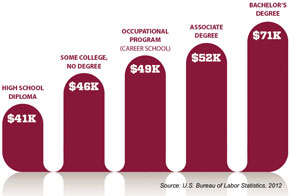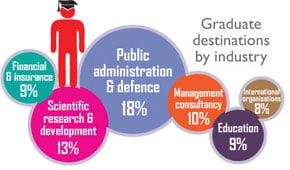
 There is a growing awareness about greater return on investment in higher education as higher studies and post graduate degrees fetch you higher salaries. A string of surveys have also indicated that a higher degree will ensure you land a job and have better chances of employment. Elets News Networks (ENN) checks out signs of the times
There is a growing awareness about greater return on investment in higher education as higher studies and post graduate degrees fetch you higher salaries. A string of surveys have also indicated that a higher degree will ensure you land a job and have better chances of employment. Elets News Networks (ENN) checks out signs of the times
If you already have a graduation degree and are scouting for a job, there are high chances that you will start earning at much lower scale than the next candidate who had a post graduate degree. But if you have a post graduate degree then you could hope for a higher salary package.
Demands are rising for a greater return on investment in higher education. By some measures, the return on investment is high: college graduates have much higher earnings and lower unemployment rates, on average, than people with a lower-level degree or diploma. The gap is even greater between the expected earnings of graduates holding a four-year bachelor-of-arts degree and those with a master’s or professional degree. The rate at which this gap is growing suggests that many students must continue their education past college to reap the full benefit of their degree.
A survey by recruitment firm, Monster India says that the level of education is a key factor that defines the pay cheque. As per the survey, someone with a professional or post-graduation degree is likely to earn Rs 100 per hour more as compared to an ordinary graduate. Also, a person who has a 3-year bachelor’s degree will earn Rs 80 per hour more than a candidate who has had only higher secondary education. “In general, it is beneficial to invest in education in order to obtain higher returns in future, in terms of wages,” says the survey report.
The increasing gap in the salary scales between the graduate and post graduate degree holders has fuelled a race of sorts among students to go in for higher studies. An awareness about higher studies and their greater prospects is gaining ground and percolating to all levels. An increasing number of surveys done in the area are also indicative of the same.

Numbers Support
A survey done globally by Graduate Management Admission Council (GMAC) has shown how business school graduates have seen a huge jump in salary offers over their pre degree levels. The students who got job offers early this year said that the post degree salary increase was nearly 90 per cent over their pre degree salary.
The GMAC study is significant since it is a non profit organisation, that runs the GMAT examination which is mandatory to gain entry to global business schools. It has its relevance not just globally but also domestically.
The survey was conducted among 3,329 graduate management students in 2015 spread across 112 universities in 29 countries. It said that more than half, as many as 59 per cent, of job-seeking graduate business students reported that they received an early job offer prior to their graduation.
The survey also showed that domestic students have higher chances of receiving an early job offer compared to international students. It said that, “In 2015, 70 per cent of domestic students seeking jobs reported an early job offer, compared with 42 per cent of job-seeking international students.” Significantly, the jobs applied by both domestic and international students is much the same yet Indian students receive 25 per cent higher interviews.
The increasing gap in the salary scales between the graduate and post graduate degree holders has fuelled a race of sorts among students to go in for higher studies. An awareness about higher studies and their greater prospects is gaining ground and percolating to all levels
In this context, the survey has defined “domestic student” as one attending school within their country of citizenship while an “International student” refers to individuals who are either studying outside their country of citizenship, or who seek to work in a location outside their country of citizenship.

As per an ASSOCHAM survey, a staggering number of students go abroad to pursue higher education including for MBA degrees. In 2014 about 7 lakh students from India went outside the country up from 2.9 lakh in 2013.
Anshu Kataria, heading Aryans Group of Colleges says, “The demand for skilled work force is not being met with by simple graduates. There is an awareness in the student fraternity for the need to go in for higher studies to get a good job at the end of their academic stint.”
India is not an isolated case when it comes to higher preference for post graduate students who end up getting better salaries. Globally the scene is much the same. A study done to understand the market forces and factors that impact salaries by Graduate Careers Australia indicated that a post graduate degree could drive you into a different pay grade, a higher one and helps you negotiate more.
The study looked at 50,000 educated job hunters and found that 86.3 per cent of post graduates who sought full time jobs landed one. In the same period 76.2 per cent of graduates who wanted a full time job finally bagged one – 10 per cent less than the post graduates.
Even as chances of a post graduate landing a job improve, it is the cost of higher education, coupled with stiff competition across India that makes people start scouting for jobs as soon as they are out of the college.
| Market Indicators |
| In 2015, 70 per cent of domestic students seeking jobs reported an early job offer, compared with 42 per cent of job-seeking international studentsJobs applied by both domestic and international students is much the same yet Indian students receive 25 per cent higher interviewsAs many as 59 per cent, of 3000 job-seeking graduate business students reported that they received an early job offer prior to their graduation |
In a global survey, where 4000 students were targeted, who were fresh out of the college, a staggering 75 per cent said that they were keen on a post graduate degree as they were convinced it would boost their employment prospects.
Another report, titled as ‘tomorrow’s growth’ that was released in 2013 by the Confederation of British Industry, predicted that the employment prospects would be much higher in the highly skilled roles. “Anticipated changes to occupational structure mean that by 2020 nearly half of all employment will be for highly skilled roles.”
 The indications are already there. Says, Katja Hall, CBI Policy Director, “Businesses already report major skills shortages in areas like manufacturing and engineering – a situation expected to become more acute as the economy picks up… In short, we need many more people to achieve appropriate higher level qualifications.”
The indications are already there. Says, Katja Hall, CBI Policy Director, “Businesses already report major skills shortages in areas like manufacturing and engineering – a situation expected to become more acute as the economy picks up… In short, we need many more people to achieve appropriate higher level qualifications.”
Back home in India, the head of the Institution of Engineering and Technology, Shekhar Sanyal, told a popular media house, “MTech, Master of Technology, graduates are in high demand and much sought-after by technical industries, not just in India but worldwide… If you are good and technically sound, MTech can open up various opportunities for you.”
The business sector too is relying heavily on the post graduate business force. The Graduate Management Admission Council studied employers in 50 countries around the world and found that 75 per cent of employers were looking at hiring MBA graduates – five percent more than previous year.
Even as the cost of post graduate degrees goes up, compelling students to think twice before they venture into higher studies, experts in the field suggest that finally it is not the degree but what you manage to do with it that defines your success. The onus finally rests on the candidate to convince the employers about your knowledge and skills.




















